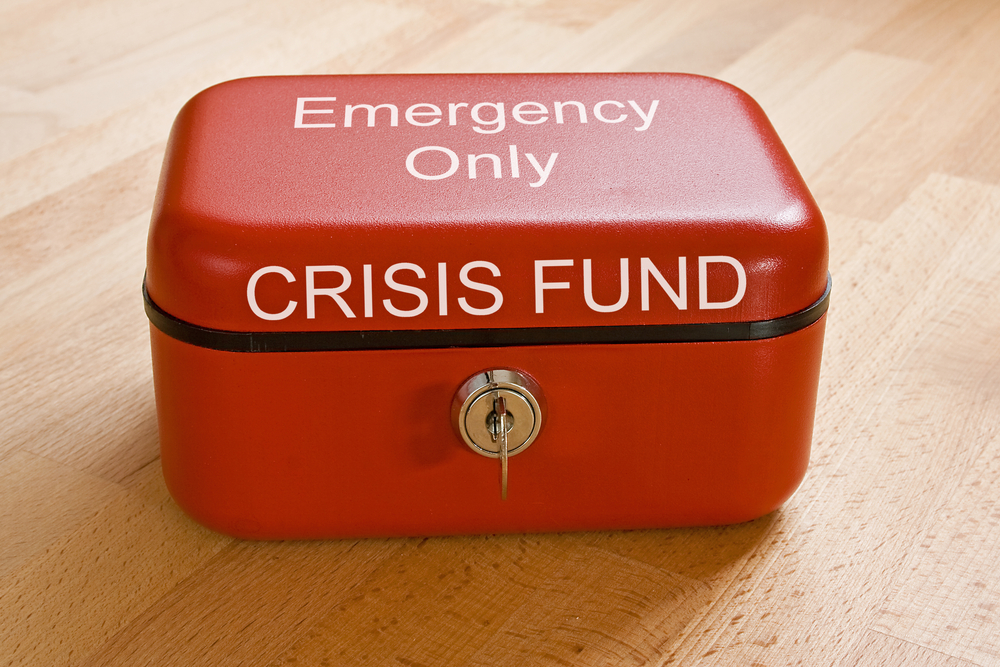Money Talk: Why You Need an Emergency Fund + How to Start One
There are many aspects of our personal finances that are important. Okay, all of them are important. But there’s one, perhaps the single most crucial, that always gets overlooked: an emergency fund.That savings account with plenty of money to cover a major, unexpected expense like the loss of a job or an unplanned operation. A savings specifically dedicated to help you cover those unexpected costs without major panic, and without having to rack up credit card debt or take out a loan.

It’s suggested that, on average, the amount of money that should make up an emergency fund is at least three to six (even better, nine) months worth of your income. Yikes! We know. Your heart just sunk a little. That's a lot of money. Don’t sweat it though. Most people feel pretty content with three months worth of pay set aside in an emergency fund. And you don’t have to load an account up with that huge chunk of change all at once. Like with any other savings account, you can build it up gradually. Here are some tips to get you started. | Related: 9 Reasons You Need an Emergency Fund
Determine How Much You Spend on the Regular
An emergency fund is going to vary greatly from person to person and family to family. No one is going to require the same amount of funds to last them the same amount of time. So, sit down and write out each cost you're absolutely tied to each month: rent, insurance, utilities, groceries, and so on. Then, consider how much you spend on more flexible costs each month: entertainment, car fuel, eating out, clothes, etc. Add them up and get your average monthly spending right there in front of you. (It might help if you’ve already created a monthly budget!) So, say you spend about $1,000 a month on everything. Just to live. That's without any costly emergencies! Now, imagine a month when your basement decides to flood or your car gets totaled. Eek! Emergency. Emergency!
Calculate Your Income
Once you’ve determined how much you’re spending per month, figure out how much income you've got coming in per month.
Let's say you're making $1,200 a month. Multiply that by 3 months, 6 months, or 9 months (however many months’ worth of pay you want in your emergency fund.) If you're making $1,200 a month, at the very the least, you'll want to have about $3,600 in an emergency fund - three months worth of income ($1,200 per month x 3 months = $3,600.) If, as mentioned above, you're spending about $1,000 a month on the cost of living, this amount would get you by for about three months in the event of job loss, or an emergency that totally wipes out the rest of your savings.
Define "Emergency Fund" for Yourself
Sit down and consider the "emergencies" that count toward your drawing money out of this account. Obviously, situations like a house fire, totaling the car, or losing a job are all pretty devastating blows to your finances and will require some extra money to help you land back on your feet. Other situations, though, aren't so black and white. For some, repairing the fence in the backyard isn't necessarily a life or death situation, but for others, it is. For some, a ding in the bumper is no big deal, for others, it's huge. Figure out what "emergency fund" means to you and stick to it. Don’t dip into that emergency fund to pay for a pair of shoes you can’t live without or a last-minute weekend getaway.
Start a Separate Savings Account
Head to your financial institution and explain that you're setting up an emergency fund savings account. This can be set up separately from your regular checking and savings accounts, that way you're not tempted to withdraw from it on a rainy day shopping trip. It's okay to start small and build up. Add a few dollars here and there. Toss your tax return in to get it started, or your birthday cash, or change you round up while cleaning the house and car. Whatever you want to do to get it in a good spot works. Hopefully, no emergencies will come your way from the get-go and you can get a pretty hefty amount built up before you ever have to dip into it.
Create Additional Backup Plans
Having an emergency fund is a wonderful and crucial start to planning for life's unexpected bumps in the road, but it's also a good idea to have a backup-backup plan. For example, when you're figuring out your monthly spending habits, determine where you could cut costs if you had to. Maybe you could go a few months buying generic over name brand or eating in rather than eating out.
If it came down to it, could you move to an apartment with lower rent to benefit from the savings? Could you part with some of your high-priced treasures by selling them to secondhand shops? Ask a friend or family member for a place to crash or a personal loan?
Take a few hours (but not too many, because then it would just get downright depressing) to think of all of the worst-case scenarios that could happen to you at this very point in your life and come up with a plan on how you'll get through financially. And don't forget to be sure you've got everything insured, too - just in case.
Here's to planning ahead!
